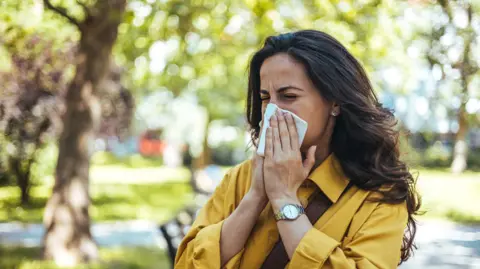**Understanding the Severity of Hay Fever in 2025**
As we step into the middle of June 2025, many individuals across the United Kingdom are grappling with seasonally exacerbated hay fever symptoms. Pollen levels are forecasted to be alarmingly high, with increasing occurrences of sneezing, itchy eyes, and other allergy-related symptoms for those sensitive to pollen. This year, a unique blend of environmental factors is making hay fever particularly intense.
**Rising Pollen Levels and Their Impact**
The recent trends indicate that pollen—a fine powder produced by grasses, trees, and other plants—is causing a considerable uptick in allergy-induced symptoms among the population. Symptoms like itchy eyes, runny noses, sore throats, and headaches are commonly reported during peak pollen seasons. Specifically, the fine particles released by birch trees and certain grasses play a prominent role in triggering these allergic reactions.
The winter weather and climatic uprisings of the previous year have allowed significant birch pollen dispersal this spring, resulting in a scenario termed a “pollen bomb.” Early summer traditionally amplifies pollen counts, and the current warm and dry conditions have only exacerbated matters—especially in rural areas where pollen is more rampant than in urban settings, where pollution can complicate symptoms further.
**Understanding Hay Fever Symptoms**
For anyone experiencing relentless sneezing, watery eyes, fatigue, and disturbed sleep, there is a strong likelihood of having hay fever. Studies suggest that around one in five people may be affected by pollen allergies, with grasses and trees as the primary catalysts. With warm, dry days contributing to an increase in airborne pollen, symptoms can escalate quickly. According to health professionals, a changing climate and fluctuating weather conditions may further lengthen pollen seasons and heighten overall pollen concentrations.
**Addressing Severe Symptoms**
Healthcare professionals emphasize the importance of treating hay fever effectively. Although there is no definitive cure, multiple treatment avenues can alleviate symptoms. Allergy expert Professor Stephen Till from Guy’s and St Thomas’ Hospitals suggests adopting a “cocktail approach” to treatment. This involves using a combination of antihistamine tablets or drops (preferably non-drowsy and long-acting), steroid nasal sprays, and eye drops to effectively tackle the multifaceted nature of hay fever.
For those struggling with treatment, detailed symptom diaries can be beneficial. By tracking symptoms and medication courses, patients can provide pharmacists with precise information on what treatments have or have not worked, thus optimizing the chances of receiving tailored recommendations.
**Complementary Solutions for Relieving Symptoms**
In conjunction with medical treatments, certain lifestyle measures can help reduce hay fever symptoms and improve overall well-being. Hygiene plays a crucial role; showering and changing clothes upon returning from the outdoors can help remove pollen clinging to the skin and clothing. Additionally, maintaining clean indoor environments through regular vacuuming, using pollen filters in cars, and avoiding activities like outdoor cooking can provide substantial relief.
Other strategic considerations include avoiding contact with certain triggers, such as freshly cut grass, open windows on high pollen days, and smoking. Incorporating protective accessories like sunglasses or masks can serve as a barrier against pollen invasion.
**Seeking Professional Help When Symptoms Worsen**
If hay fever symptoms become debilitating, it’s essential to consult a physician. Local General Practitioners (GPs) may refer patients to allergy specialists when over-the-counter remedies are insufficient. Immunotherapy—gradual desensitization to allergens over time—is a potential avenue that can offer relief to severely affected patients. However, past treatments with corticosteroids, such as the Kenalog injection, are no longer recommended due to serious side effects associated with their use.
**Do Natural Remedies Like Local Honey Work?**
Despite popular belief, consuming local honey does not alleviate hay fever just as bees do not pollinate trees or grasses but rather focus on flowering plants. The absence of scientific evidence supporting the efficacy of honey in combating hay fever underscores the need to rely on clinically approved treatments.
Amid rising pollution, climate change, and volatile weather patterns, hay fever remains a substantial concern in 2025. Adapting preventive strategies alongside effective treatments can help those affected better manage their symptoms during this pollen-heavy season.



